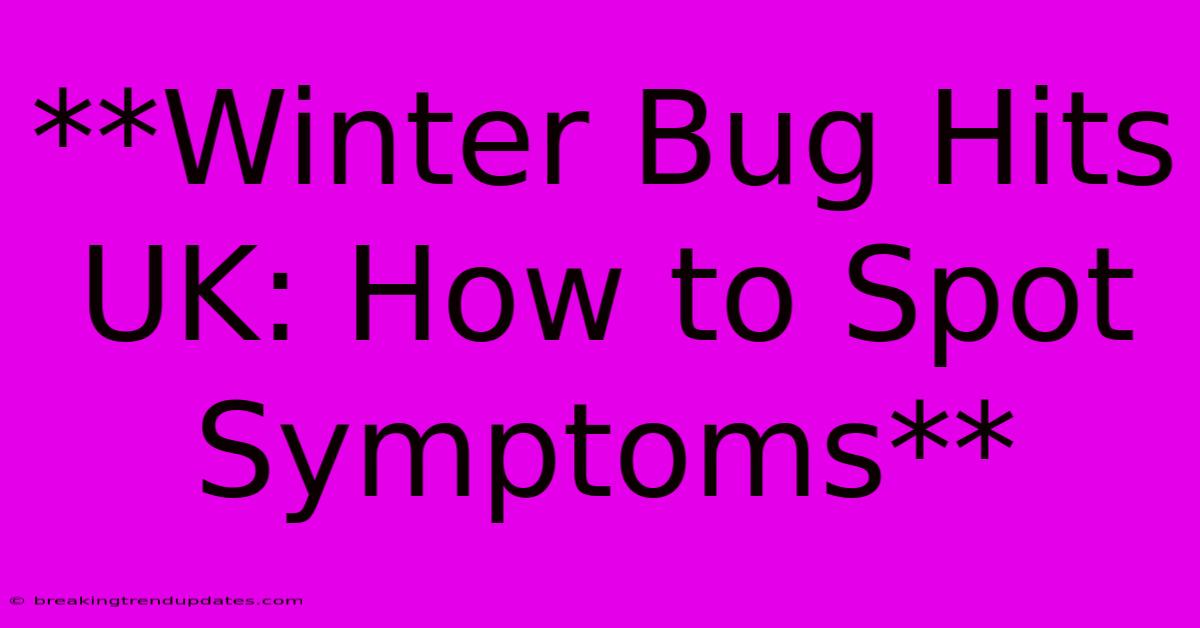**Winter Bug Hits UK: How To Spot Symptoms**

Discover more detailed and exciting information on our website. Click the link below to start your adventure: Visit Best Website breakingtrendupdates.com. Don't miss out!
Table of Contents
Winter Bug Hits UK: How to Spot Symptoms and Stay Healthy
As the cold weather descends upon the UK, so too do the dreaded winter bugs. From common colds to more serious flu strains, it's crucial to be aware of the symptoms and take steps to protect yourself and your loved ones. This article will guide you through identifying common winter bug symptoms and offer helpful tips for staying healthy throughout the season.
Recognizing the Telltale Signs
Colds:
- Runny nose: Clear, white, or yellow mucus.
- Sore throat: Scratchy, painful sensation.
- Cough: Dry or productive, with phlegm.
- Sneezing: Frequent, forceful expulsion of air.
- Headache: Mild to moderate discomfort.
- Fatigue: Feeling tired and drained.
- Muscle aches: Mild pain in the body.
Flu (Influenza):
- High fever: Often accompanied by chills.
- Severe muscle aches: Muscle weakness and pain.
- Headache: Severe and persistent.
- Cough: Dry and persistent.
- Sore throat: More intense than a cold.
- Fatigue: Extreme exhaustion.
- Stuffy nose: Difficulty breathing through the nose.
- Nausea and vomiting: More common in children.
Other Winter Bugs:
- Gastroenteritis (stomach flu): Nausea, vomiting, diarrhea, abdominal cramps.
- Bronchitis: Persistent cough with phlegm, chest tightness, wheezing.
- Pneumonia: Chest pain, shortness of breath, fever, coughing.
Key Differences: Cold vs Flu
It can be tough to differentiate between a cold and the flu, especially at the onset. Here are some key differences:
- Severity: The flu typically causes more severe symptoms than a common cold.
- Fever: A fever is more common and higher in the flu, whereas a cold may only have a low-grade fever.
- Duration: Cold symptoms usually last 7-10 days, while flu symptoms can linger for 2 weeks or more.
Tips for Staying Healthy
- Wash your hands frequently: Use soap and water or hand sanitizer.
- Cover your mouth and nose: When sneezing or coughing, use a tissue or cough into your elbow.
- Get enough sleep: Aim for 7-8 hours of sleep per night.
- Stay hydrated: Drink plenty of fluids.
- Eat a healthy diet: Focus on fruits, vegetables, and whole grains.
- Manage stress: Stress can weaken the immune system.
- Get vaccinated: The flu vaccine is highly effective at preventing serious illness.
When to See a Doctor
- High fever: If you have a fever over 100.4°F (38°C).
- Severe symptoms: If you have severe muscle aches, headache, or difficulty breathing.
- Symptoms lasting longer than usual: If cold symptoms persist beyond 10 days or flu symptoms beyond 2 weeks.
Conclusion
Winter bugs are a common occurrence, but by understanding the symptoms and taking proactive steps to stay healthy, you can help protect yourself and your loved ones from the worst of the season. Remember, if you experience any severe symptoms, it's best to seek medical attention. Stay healthy and enjoy the winter season!

Thank you for visiting our website wich cover about **Winter Bug Hits UK: How To Spot Symptoms**. We hope the information provided has been useful to you. Feel free to contact us if you have any questions or need further assistance. See you next time and dont miss to bookmark.
Thank you for visiting our website wich cover about **Winter Bug Hits UK: How To Spot Symptoms**. We hope the information provided has been useful to you. Feel free to contact us if you have any questions or need further assistance. See you next time and dont miss to bookmark.
Featured Posts
-
Scissor Sisters Birmingham Concert Announcement
Nov 01, 2024
-
Boones Job Security Yankees Outlook
Nov 01, 2024
-
Piyesta Opisyal Nagpaaga Sa Paglabas Ng Presyo Ng Polish Steel
Nov 01, 2024
-
Ta Cnicas De Golpeo De Golpe En Golpe
Nov 01, 2024
-
Knicks Outlast Opponent With Towns 44 Points
Nov 01, 2024
